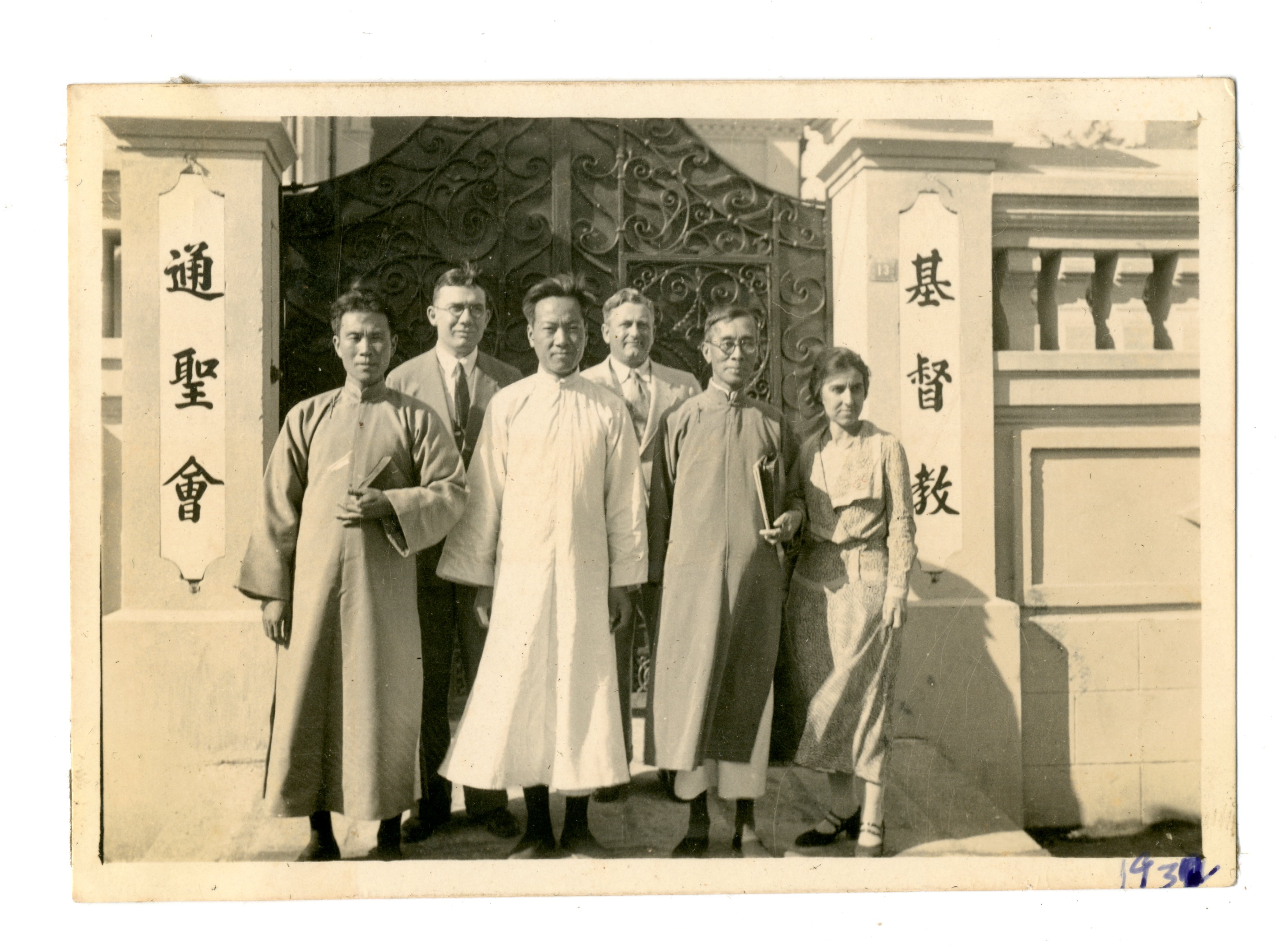
1871 — 1936
Ding Limei
Outstanding 20th century Chinese revivalist, evangelist, theological educator, and writer. Called by foreigners, the “John Mott of China.”

Note: This biography was originally posted in November of 2020.
Ding Limei is pictured above, center, wearing a white teacher’s gown.
Ding Limei (“Established Beauty”) was born October 2, 1871, in a Christian home in Liaozhou, Dai Xing Tong, Shandong. His father, Ding Chitang, was one of the first Christians in Shandong. At the age of thirteen he left home for Dengzhou (today Penglai) and enrolled in Wen Huiguan (the predecessor of Quillius University), which had been founded by the American Presbyterian Church. After graduating from Wen Huiguan University at the age of twenty, he taught at the Weihsien Christian Grade School. With another teacher, he founded the Wen Nu Zhong (Wenmei girls’ high school) in Shandong. In 1895, he returned to Wen Huiguan at the age of twenty-six to study theology for two years. He was ordained in 1898 and served as a pastor for two years, during which time he also preached in various parts of Shandong.
During the Boxer Uprising in 1900, he was thrown into prison for forty days, and suffered almost 200 blows by the rod, leaving his skin torn open. Afterwards Presbyterian missionary Calvin Mateer, who was also the Principal of the Wen Huiguan, asked help from Yuan Shikai, who was Governor of Shandong Province, and Ding was set free.
After his release, he resolved to preach the gospel in every province in China, to establish an indigenous Chinese church, and save the souls of millions of his countrymen. He believed that the key to securing a Christian future for his nation was to reach students for Christ. While serving as pastor of a Presbyterian church, he was often invited to various places to conduct revival and evangelistic meetings. He traveled to Hebei, Henan, Manchuria, and the middle and lower reaches of the Yangtze River. In the fires of revival, thousands repented and put their faith in Christ. His preaching was especially attractive to intellectuals; many young people offered themselves for Christian service.
From 1908 to 1923, Ding concentrated upon itinerant evangelism, and his ministry spread to every important province in China. Though described as mild-mannered, Ding apparently possessed great spiritual power from God. In 1909, Ding played a major part in a strong religious revival at Shandong Union College, inspiring more than 100 young men to enter the Christian ministry. He was then invited to institutions in Tianjin, Tungchow, and Beijing, where he was instrumental in the decisions of over 200 others to enter the ministry. In June 1920, the China Young Men’s Christian Association (YMCA) of Hebei convened “The North China Student Conference.” At this gathering, the China Student Volunteer Movement Evangelistic Band was formed, with the motto, “The evangelization of our mother country and the world in this generation.” Ding Limei was chosen as the first traveling secretary for the YMCA. He traveled throughout China, speaking in churches, universities, and secondary schools, conducting revivals, and forming “evangelistic bands.” In 1920, he led 87 evangelistic meetings and preached more than 200 times. At evangelistic meetings in Beijing and Shandong, thousands professed faith in Christ. Through preaching at other places, several people who became famous Christian workers dedicated their lives for service, including: notable historian Jian Youwen; women’s educationalist, Zeng Baosun, the granddaughter of Zeng Guofan; Chinese indigenous theology advocate Professor Xie Fuya, and others. In 1918, being moved by the importance of missions, at Guling Shan in Jiangxi, he and some others founded the China Inland Evangelistic Society. Together, they promoted evangelistic movements in every part of the country. As the general secretary, he personally led evangelistic teams to Yunnan, Guizhou, Tibet, Mongolia, and other border provinces, taking the gospel to minority peoples in these regions. In 1919, he had fulfilled the resolution he had made, having taken the gospel to 18 provinces of China.
While he traveled far from home, his ancestral village of Da Xintan was marvelously spared by God during floods which destroyed a larger village just across the river and on a higher elevation.
As he was getting older and beginning to experience some problems with his health, in 1923 Ding turned his energies from itinerant evangelism to theological education. He was burdened with the realization that although he had led thousands of people to faith in Christ, many had perished because they lacked a basic knowledge of the Scriptures. He first taught for eight years at the North China Theological Seminary, then pastored a church in Manchuria for a while. In 1932, he accepted a position as professor at a Bible College run by Tong Sheng Hui in Tianjin, serving as its assistant dean until his death. At a revival meeting held by Dr. Song Shangjie in Tianjin, he first humbly went forward to confess his sins, and later led a group in follow up work.
In the last two years of his life, he came down with liver cancer. During his illness, he remained at home with his family and devoted his time to prayer and writing. Despite his cancer, he prayed earnestly for the church and the entire populace. He had always greatly emphasized prayer and always carried with him a little notebook. At the time of his death, there were three such notebooks with the names of five thousand people, for whom he prayed individually. Ding Limei died on September 22, 1936, at the age of 65, and was buried in the English cemetery in Tianjin. He was survived by his wife and three daughters.
Sources
China Group, “Ding Limei,” in Scott W. Sunquist, editor, A Dictionary of Asian Christianity. Grand Rapids: Eerdmans, 2001, 244-245.
Paul Hattaway, Shandong: The Revival Province. The China Chronicles. London: SPCK, 2018, 97-100.
About the Author
Senior Associate, Global China Center; Chinese Editor, Biographical Dictionary of Chinese Christianity.
Director, Global China Center; English Editor, Biographical Dictionary of Chinese Christianity, Charlottesville, Virginia, USA.



